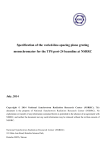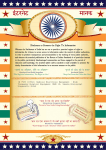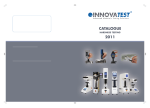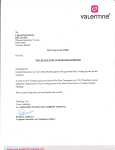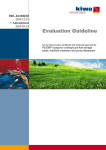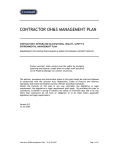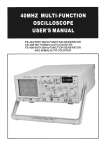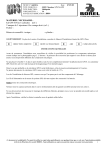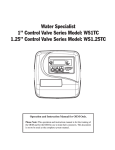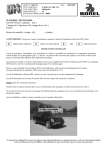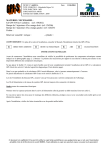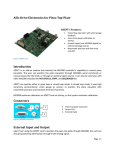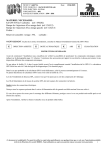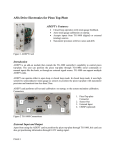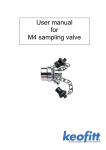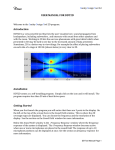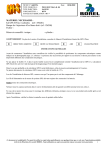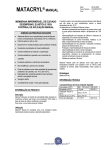Download IS 13432-1 (1992): Gas leak detector for use with low pressure
Transcript
इंटरनेट मानक Disclosure to Promote the Right To Information Whereas the Parliament of India has set out to provide a practical regime of right to information for citizens to secure access to information under the control of public authorities, in order to promote transparency and accountability in the working of every public authority, and whereas the attached publication of the Bureau of Indian Standards is of particular interest to the public, particularly disadvantaged communities and those engaged in the pursuit of education and knowledge, the attached public safety standard is made available to promote the timely dissemination of this information in an accurate manner to the public. “जान1 का अ+धकार, जी1 का अ+धकार” “प0रा1 को छोड न' 5 तरफ” “The Right to Information, The Right to Live” “Step Out From the Old to the New” Mazdoor Kisan Shakti Sangathan Jawaharlal Nehru IS 13432-1 (1992): Gas leak detector for use with low pressure liquefied petroleum gas burning appliances, Part 1: Mechanical type [MED 23: Domestic and Commercial Gas Burning Appliances] “!ान $ एक न' भारत का +नम-ण” Satyanarayan Gangaram Pitroda “Invent a New India Using Knowledge” “!ान एक ऐसा खजाना > जो कभी च0राया नहB जा सकता ह” है” ह Bhartṛhari—Nītiśatakam “Knowledge is such a treasure which cannot be stolen” IS 13432 ( Part 1 ) : 1992 (Reaffirmed 2002) Indian Standard GASLEAKDETECTORFORUSEWITHLOW PRESSURE LIQUEFIED PETROLEUM GAS BURNING APPLIANCES-SPECIFICATION PART UDC 1 MECHANICAL TYPE 614~842,435 : 654.924-553 Q BIS 1992 BUREAU MANAK April 1992 OF BHAVAN, INDIAN STANDARDS 9 BAHADUR SHAH NEW DELHI 110002 ZAFAR MARG Price Group 2 Domestic and Commercial Gas Burning Appliances Sectional Committee, HMD 23 FOREWORD This Indian Standard ( Part 1 ) was adopted by the Bureau of Indian Standards, after the draft finalized by the Domestic and Commercial Gas Burning Appliances Sectional Committee had been approved by the Heavy Mechanical Engineering Division Council. Liquefied petroleum gases ( LPG ) produced and marketed in India generally conform to 1s 4576 : 1978 ‘Specification for liquefied petroleum gases (Jirst revision )’ and designated as Commercial Butane/Propane Mixture. LPG is colourless, odourless and being highly inflammable, a malodourant ( foul smell ) is added to detect gas leakage. I’he gas is twice as heavy as air and can form explosive mixture with air even in very small concentrations. In view of the above and other safety related properties some simpIe rules/code need be observed for its safe operation/installation. Because the rules are simple, they are neglected. Failure to observe these rules may lead to accidents of varying intensity. The use of LPG in individual household has been widely expanding and protection of consumers from the hazards arising during installation and operation is of vital interest. Leak detector is a device used for detecting, locating or measuring or combination thereof. This standard ( Part 1 ) lays down the requirements of mechanically operated Gas Leak Detectors Electronically operated Gas Leak Detectors are also used with LPG burning appliances. avaiIable in the country and for covering their requirements a separate standard ( Part 2 ) is under preparation. For the purpose of deciding whether a particular requirement of this standard is complied with, the final value, observed or calculated, expressing the result of a test or analysis, shall be rounded off in accordance with IS 2 : 1960 ‘Rules for rounding off numerical values (revised)‘. The number of significant places retained in the rounded off value should be the same as that of the specified value in this standard. IS 13432 ( Part 1) : 1992 Indian Standard GASLEAKDETECTORFORUSEWITHLOW PRESSURE LIQUEFIED PETROLEUM GAS BURNING APPLIANCES-SPECIFICATION PART 1 MECHANICAL Component 1 SCOPE 1.1 This standard specifies materials, construction, performance and testing requirements for gas leak detectors of mechanical type for use with low pressure [ 2.942 kN/mg ( 30 gf/cmg ) nominal gas inlet pressure] liquefied petroleum gas burning appliances. 1.1.1 For convenience this standard divided in two sections as follows: Brass parts Springs has been Section 1 Material and construction Section 2 Performance and testing ments Sheet metal parts require- The Indian Standards listed in Annex necessary adjuncts to this standard, SECTION 1 MATERIALS CONSTRUCTION Tubes (see IS 1545 : 1982. IS 2501 : i985, IS 8119 : lb76 and IS 10773 . 1983 ) AND 3.1 Components and parts that may come in contact with LPG shall be manufactured from or be treated with materials compatible with LPG as well as be unaffected by chemical or thermal influences that may be encountered in normal use. For guidance some appropriate materials are specified in table below but other type of materials may be used provided that the of performances, durability and standards safety of gas leak detectors are not lowered. 3.2 Typical materials of various detector are shown below: Component Body Cover Rubber parts Plastic parts parts Free cutting brass ( see IS 3i7 : 1989 ) Stainless steel [ see IS 4454 ( Part 4 ) : 1975 ] Spring steel [see IS 4454 ( Part 3 ) : 1975 ] Phosphor bronze ( see IS 7608 : 1987 ) Cold rolled steel ( see IS 513 : 1986 ) Brass sheet (see IS 3168 : 1981) Steel-surface treated for corrosion resistance Brass ( see IS 319 : 1989 ) Engineering plastics A are AND COMPONENTS Material Gears 2 REFERENCES 3 MATERIAL TYPE 3.3 Al1 copper and copper alloy parts shall pass the mercurous nitrate test ( season cracking test ) when tested according to the method specified in IS 2305 : 1988. 3.4 Non-metallic materials normally in contact with the gas shall not swell more than 15 percent of the volume after being immersed in pentane or LP Gas for 72 hours at room temperature, when tested according to Annex B of IS 5116 : 1985. 3.5 The material of diaphragm, if provided, shall be of synthetic rubber or any other suitable material and if it is rubber, shall satisfy the requirements given in 3.5.1 to 3.5.6. of the Material 3.5.1 The material shall be free from porosity pits and foreign particles and shall have a smooth, non-tacky surface with minimum taIc or bloom. Zinc alloy ( see IS 742 : 1981 ), Aluminium alloy (see IS 617 : 1975 ) Aluminium alloy ( see IS 617 : 1975 ) Engineering plastics LPG resistant rubber Engineering plastics 3.5.2 The material shall not show change of more than 10 IRHD when subjected to the accelerated in 3 or 4 of _ ageing test described -_ _ IS 34UO( Part 4 ) : 1987. 1 IS 13432( Part 1) : 1992 3.5.3 The material shall be such that when an assembled gas leak detector is subjected to a pressure up to 150 kPa ( l-5 kgf/cm2 ) from the side subjected to pressure while normal working, the diaphragm shall not pull out or burst. 3.5.4 The material shall be capable of withstanding a clamping pressure of 98 kPa ( 1 kgf/ cm2 ) where by the material itself or the substance with which the fabric layer has been impregnated shall not be pressed away, flowed away or be bruised or otherwise damaged. 3.5.5 The material shall after immersion in pentane or test gas as defined in Appendix A of IS 9798 : 1981 for 72 hours, meet the requirements tabulated in Appendix D of IS 9798 : 1981. After this test, change in hardness value from before to after the test shall not exceed 15 IRHD [ see IS 3400 ( Part 2 ) : 1980 1. NOTE - The test at 3.5.1 to 3.5.5 are work batch tests. On initial seIection of a diaphragm material, it shall also be tested in test gas in vapour phase for 72 hours, and shall not show a weight or volume change greater than 15 percent. 4 CONSTRUCTION AND WORKMANSHIP 4.1 The construction of all the parts of detector shall be of high standard of workmanship and finish. The construction shall ensure durability with leak tight joints wherever applicable and shall comply with 6 of this standard. 4.2 A.11gas carrying joints shall be leak tight and resistive to a temperature of 120°C. 4.3 Screw threads, if provided shall compIy with the requirements of IS 554 : 1985 or IS 2643 ( Part 1) : 1975 or IS 4218 ( Parts 1 to 4 ). 4.4 Gas leak detector for retrofitting with gas burning appliance shall have inlet, and/or outlet nozzle conforming to 17.1 and 17.2 of IS 5116 : 1985. 4.5 The gas carrying parts of the detectors shall be tested with a air pressure of 14-71 kPa 150 gf/cms ) and shall not ( approximately show any leakage. 4.6 All nuts, bolts and fittings having spanner flats shall by capable of being tightened or slackened by suitable spanner or be readily accessible to an adjustable spanner. 5 GENERAL 5.1 The detector shall be so designed that when fitted on the LPG burning appliance there shall not by any obstruction or protrusion beyond the normal protrusion of knobs and other controls of the appliance. 5.2 For integral fitment model, the gas leak detector shall have provision for fitting to gas rail of gas burning appliances so as to give a leak tight and durable joints. 5.3 After fitting the detector on the gas burning appliance, there shall be no change in the normal operation of the gas burning appliances. The device shall function with the normal pressure available in the gas rail. The detector thus fitted for leak detection shall not change any of the existing requirements of relevant appliance standards. 5.4 The gas leak detector when mounted with the appliance shall detect leak from entire low pressure installation connected to the appliance. 5.5 The detector shall also be capable of detecting a leakage of minimum 4 mmg/sec from the system to the atmosphere at 2.942 kN/ml ( 30 gf/cm2 ) pressure. SECTION 2 TESTING PERFORMANCE REQUIREMENTS AND 6 GAS SOIJNDNESS 6.1 The detectors shall be tested for gas soundness at the room temperature by the folIowing method. Subject the detector to be tested to an air pressure of 14.71 kPa ( approx 150 gf/cme ) with the bubble leak indicator (see Fig. 6 of IS 5116 : 1985 ) in the air supply line. Examine the bubble indicator for the successive bubbles. The time taken between successive bubbles shal1 not be less than one minute. 6.1.1 Resistance to High Temperature The gas leak detector is exposed to a temperature of 120°C for a minimum period of 30 minutes for the complete unit to attain this It is then removed and left temperature. exposed to the atmosphere until the assembIy returns to ambient conditions, after which it is tested according to 6.1. 6.1.2 Resistance to Low Temperature The gas leak detector is exposed to a temperature of -20” C for a minimum period of 30 minutes for the detector to attain this temperature. It is then removed and left exposed to the atmosphere until the assembly returns to ambient conditions, after which it is tested according to 6.1. 7 SURFACE TEMPERATURES 7.1 The detector when fittted with the appliance shall be fitted at a place where the temperature does not reach 12OoC during normal working conditions. IS 13432 ( Part 1) : 1992 7.2 No part of the retrofitted detector with the appliance using rubber tubing shall exceed a temperature of 65°C after 2 hours of normal working of the appliance. service conditions and could introduce improper parameters of assessment of non-flexibles. The test shouId relate only to the flexibles referred to above. 8 CYCLE TEST 9 TESTING ( ENDURANCE TEST ) 8.1 When assessing a new design, a type approval test in the form of a ON - OFF cycle test of the gas leak detector shall be carried out. For the purpose of this standard one cycle means pressurizing the detector to 2.942 kN/ma ( 30 gf/cm” ) and releasing. A fully assembled gas leak detector unit shall stand a minimum of 100 000 cycles of sensor indicator operations. After this test the detector shall meet the requirements of 6.1. 8.2 For batch acceptance cycles shall be 20 000. tests the number 8.3 The purpose of the test is to evaluate the quality of various tlexibles such as diaphragm retention of critical and spring, vis-a-vis properties relevant to function, resistance to deformation/degradation, loss of flexibility This under condition of flexing and unflexing. test does not purport to check any mechanical requirements of the construction/assembly and should not be taken as representative of actual OF THE DETECTOR Each leakage detector shall be tested for its calibration by creating an artificial known leak by suitable method to check sensitivity according to 5.5. 10 MARKING 10.1 Detector shall be clearly and permanently marked with the following: a) Manufacturer’s name, initials or registered trade-mark; b) Number of this standard; cl The words ‘For use with liquefied petroleum gases at 2.942 kN/m* ( 30 gf/cm’ ) nominal pressure; and Any other markings agreed to between d) the purchaser and the manufacturer. 10.1.1 BIS Certification Marking Details available Standards. with the Bureau of Indian IS 13432( Part 1) : 1992 ANNEXA ( Clause 2 ) LIST OF REFERRED Title 319 : 1989 Free cutting brass, rods and sections - Specification (fourth revision) 513 : 1986 Cold-rolled low carbon steel sheets and strips ( third rev&on ) 554 : 1985 Dimensions for pipe threads where pressure tight joints are required on the threads ( third revision ) 3168 : 1981 Title Zinc base alloy die castings ( second revision) 1545 : 1982 Solid drawn copper alloy tubes for condenser and heat exchangers ( ( second revision) 2305 : 1988 Method for mercurous test for copper and alloys (first revision ) 2501 : 1985 tubes for Copper engineering purposes vision ) Brass strip and foil for drawing (first revision) Method 3400 ( Parts 1 to 10 ) rubbers 4218 ( Parts 1 t04j: 1976 4:;;$ Aluminium and aluminium alloys ingots and castings for general engineering purposes ( second revision ) 742 : 1981 2;;;( STANDARDS IS No. IS No. 617 : 1975 INDIAN deep of test for vulcanized 1SO metric screw threads formed Part 3 ) : Steel wires for cold springs: Part 3 Oil hardened and tempered steel wires alloyed ( first revision ) 4:;;5’ Part 4 ) : Steel wires for cold formed springs: Part 4 Stainless spring steel wire for normal corrosion resistance (first revision) . 5116 : 1985 requirements for General domestic and commerial equipment for use with LPG (second revision ) nitrate copper 7608 : 1987 Phosphor bronze general engineering ( jirst revision ) general (second 8119 : 1976 Copper brazed steel tubing 9798 ; 1981 Specification for low pressure regula’tors k% use with TLPG mixtures for pipe threads Part 1) : Dimensions for fastening purposes : Part 1 Basic profile and dimensions (first revision ) 10773 : 1983 4 wire for purposes Copper tubes for refrigeration purposes --Standard Mark The use of the Standard Mark is governed by the provisions of the Burtm ofIndian Standards Act,1986and the Rules and Regulations made thereunder. The Standard Mark on products covered by an Indian Standard conveys the assurance that they have been produced to comply with the requirements of that standard under a well defined system of inspection, testing and quality control which is devised and supervised by UIS and operated by the producer. Standard marked products are also continuously checked by BIS for conformity to that standard as a further safeguard. Details of conditions under which a licence for the use of the Standard Mark may be granted to manufacturers or producers may be obtained from the Bureau of Indian Standards. Bureau of Indian Standard established under the Bureau of Indian Standards Act, 1986 to BIS is a statutory institution promote harmonious development of the activities of standardization, marking and quality certification of goods and attending to connected matters in the country. Copyright BIS has the copyright of all its publications. No part of these publications may be reproduced in any form without the prior permission in writting of BIS. This does not preclude the free use, in the course of implementing the standard, of necessary details, such as symbols and sizes, type or grade designation. Enquiries relating to copyright be addressed to the Director ( Publications ), BIS. Revision of Indian Standards Indian Standards are reviewed periodically and revised, when necessary and amendments, if any, are issued from time to time. Users of Indian Standards should ascertain that they are in Comments on this Indian Standard may be possession of the latest amendments or edition. sent to BIS giving the following reference: Dot : Noa HMD 23 ( 0060 ) Amendments Issued Since Publication Amend No. Date of Issue Text Affected BUREAU OF LNDIAN STANDARDS Headquarters: Manak Bhavan, 9 Bahadur Shah Zafar Marg, New Delhi 110002 Telephones : 331 01 31, 331 13 75 Telegrams ( Common : Manaksanstha to all Offices ) Regional Offices : Central : Manak Bhavan, 9 Bahadur NEW DELHI 110002 Eastern Telephone Shah Zafar Marg : l/l4 C. I. T. Scheme VII M, V. I. P. Road, Maniktola CALCUTTA 700054 Northern : SC0 445-446, Sector 35-C, CHANDIGARH 160036 Southern : C. I. T. Campus, IV Cross Road, MADRAS 600113 Western : Manakalaya, Branches E9 MIDC, Marol, Andheri ( East ) BOMBAY 400093 33101 31 E331 13 75 37 84 99, 37 85 61, r 37 86 26, 31 85 62 53 38 43, 53 16 40, 53 23 84 i 41 24 42, 41 25 19, I 41 23 15, 41 29 16, 632 9295, 63 27 80, 632 78 92 : AHMADABAD, BANGALORE, BHOPAL, BHUBANESHWAR, COIMBATORE FARIDABAD, GHAZIABAD, GUWAHATI, HYDERABAD, JAIPUR, KANPUR, LUCKNOW, PATNA, THIRUVANANTHAPURAM. Printed at Printwell Printers, Aligarb, India AMENDMENT NO. 1 SEPTEMBER 1996 TO IS 13432 ( Part 1) : 1992 GAS LEAK DETECTOR FOR USE WITH LOW PRESSURE LIQUEFIED PETROLEUM GAS BURNING APPLIANCES SPECIFICATION FART 1 MECHANICAL ( First cover page and page 1 ) - Substitute TYPE the following for the existing title: ‘GAS LEAK INDICATOR FOR USE WITH LOW PRESSURE LIQUEFIED PETROLEUM GAS BURNING APPLIANCES - SPECIFICATION PART ( AIZpages, General ) appears. 1 MECHANICAL TYPE ’ Substitute word ‘indicator’ jor ‘detector’ wherever ( Second cower page, Foreword ) - Insert the following aCtcr fourth para: ‘At present the products covered under this standard shall be certified along with the appliance and individual product certification shall be considered later.’ (Puge 1, clultse 3.5, lust line ) - (Page 2, clause 4.4 ) - Substitute Delete. ( Page 2, clause 5.2, first line ) model’. (Page “5.5 2, clause 5.5 ) -Substitute Sensitivity ‘3.55’ for ‘3.5.6’. Delete the words ‘For integral fitment the following for the existing: of Leak indicator The indicator shall be capable of detecting a leak of one bubble per 25 seconds when tested according to Annex I3 at a pressure of 2.942 kN/m* (30 gf/cm*) and with the appliance. The indicator shall show ‘Leak’ when the time taken between successive bubbles is less than 25 seconds. The indicator shall not show ‘Leak’ when the time taken between successive bubbles is more than 25 seconds. Amend No. 1 to IS 13432 ( Part 1 ) : 1992 5.6 The dial shall indicate the words ‘ Normal’ and ‘Leak’ so that the consumer gets instant indication for preventive action. ‘Normal’ and ‘Leak’ indication may also be indicated by green and red colours respectively. 5.7 Each leak indicator shall be supplied with an user’s manual giving all the details for installation, principle of working, method of operation for finding the leak and the following limitations: a) Does not locate the leak, b) Does not prevent the leak, c) Does not gi:rc audible alarm, d) Does not indicate leak when the appliance is in operation, e) Works only under the specified procedures, f) Calibration g) Leakage indication according to the time :uent.ioncd in this manual.” at a pressure of 2.942 kNjm2 (30 gf/cm’), and (Page 3, clalr.sc 7.2 ) -- DCM~. (Pn~e 4, Annex A) - Insert the following Annex at the end: “ANNEX ( Chlsc 8 5.5 ) n-1 Procedure B-l.1 Test the Appliance for Sensitivity hy the Following Method B-1.1.$ Subject ihe appliance to be tested to an air supply at a pressure of 2.942 mfrn (30 gflcm ) with the bulkk leak indicator ( see Fig. I ) \n OK air supply line. Adjust the time between two successive bubbles as 25 seconds by creating an artificial leak through needle valve or any other device. Cut off the air supply to the appliance to confine system pressure. Then observe the indication in the gas leak indicator. 2 Amend 6mm FIG. 1 No. ID GLASS 1 to IS 13432 (Part 1) : 1992 TUBING BUHIEL LEAK IND!CATOH (HMD23) Reprography IJnic,131S, New Delhi, India














